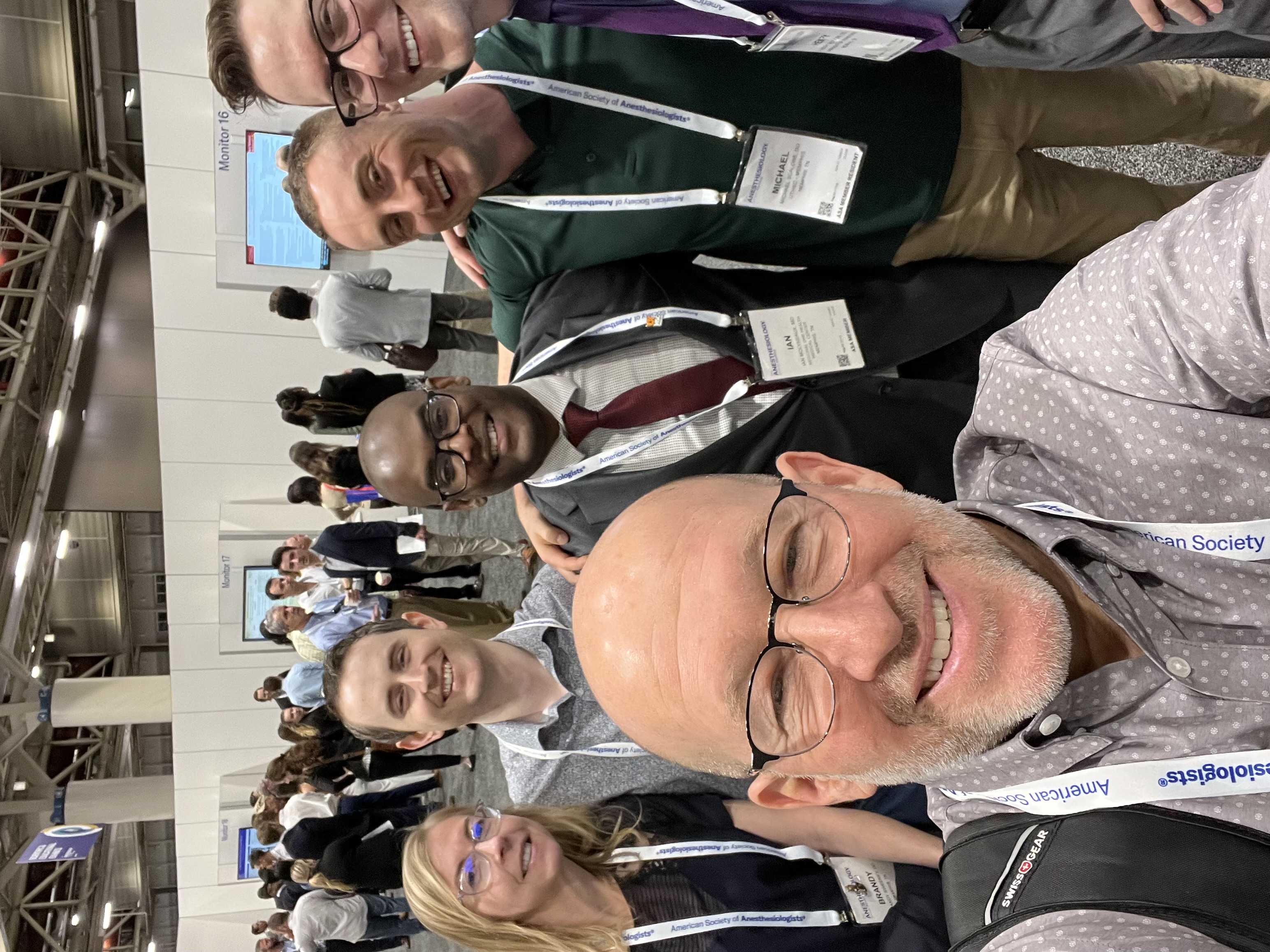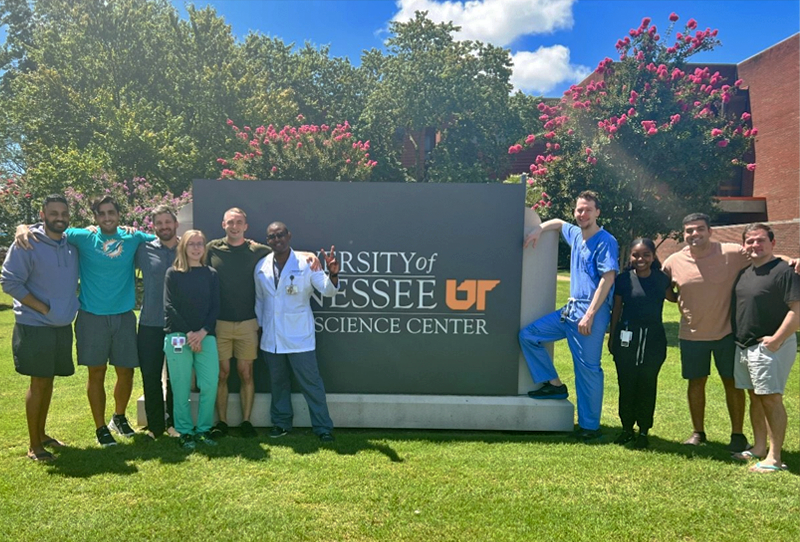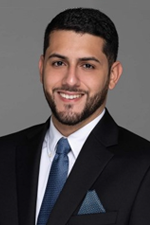Applicants
Interviews
Interviews will be done virtually via zoom with at least 3 faculty members. We will also have virtual meet and greets with current residents via zoom.
In-person campus tours will be available to prospective candidates who wish to visit the campus. Tours will not affect the rank list in any way. Dates to be announced.
Application Process

The following are mandatory for application:
- A completed Resident application form using the ERAS system.
- Dean's letter and medical school transcript.
- Three letters of recommendation from clinicians who have worked with the applicant during the past two years.
Applicants must be US citizens, permanent residents or foreign nationals eligible for J-1 visas. We do not sponsor H1-B visas.
ERAS 2026 Residency Application TimelineSignaling
Most anesthesia programs, including the UT Health Science Center, will participate in signaling through ERAS. Anesthesiology offers 15 program signals - 5 gold, 10 silver. This allows applicants to denote their top 5 programs and an additional 10 programs of particular interest. Importantly, home programs and programs at which an away rotation was completed are not excluded from signaling.
The AAMC and SAAAP encourage signaling, including to home programs. Applicants should signal all programs that they have both a strong interest in and where they have a reasonable ability to receive an interview INCLUDING their home programs if they are interested in them.
For UT Health Science Center, applicants should signal their home programs. Signals should be used to denote an applicant's true preference; thus, applicants can consider using a gold or silver for programs at which they rotated or at their home institutions or they may not signal at all if that reflects their true preferences. A gold or silver signal offers a greater chance of receiving an interview invite. As a reminder, a signal does not guarantee an interview invite.

Selection Criteria
Positions will be offered through the National Residency Matching Program (NRMP) and all applications should be submitted through Electronic Residency Application Service (ERAS).
The selection committee is made up of junior and senior faculty who evaluate candidates holistically. Candidates of all backgrounds are welcome to the program as we search for those who will be an ideal fit. We hope to find candidates with a long history of teamwork, personal growth & reflection, excellent communication skills, professionalism, eagerness to learn, and resiliency.
Interview offers will be sent out via Thalamus or by the program manager electronically (via e-mail or calendar invites) in waves up until December 1, with all interviews completed before December 22. Interviews will be completed virtually by a panel of four interviewers made up of faculty and residents.
We will offer a very limited number of second-look opportunities to all interviewed applicants. Dates and times will be forthcoming. The choice of an applicant to participate or not participate in a second look must not impact rank list placement.
Application Requirements
The application deadline is November 1. Applications received after this date will not be reviewed.
Review of applications and interviews will be prioritized for applicants who Signal the program.
Only complete applications will be considered for interview, a complete application includes:
- ERAS CV
- Current Photograph
- Personal Statement
- Medical School Transcript
- MSPE
- Three letters of recommendation with at least two being from anesthesiologists
- USMLE or COMLEX Scores
- We will consider applicants holistically so there is no firm minimum score for USMLE or COMPLEX
- Step 1/Part 1 should be passed on the first attempt
- Step 2 CK/Part 2 CE must be available on application submission and should be passed on the first attempt
IMG Requirements
Anesthesiology has become a highly competitive residency with many deserving candidates, therefore only a small number of interviews will be extended to international medical graduates. Please refrain from emailing program leadership to express interest in the program or to highlight your application again as these emails will not be answered or influence interview offers.
We unfortunately are not able to sponsor H1 visas and can sponsor J1 visas on a limited basis.
USMLE Step 1, 2 CK and 3 must be passed on the first attempt. If applicants took USMLE Step 1 prior to January 1, 2022, scores must be at least 240 and a Pass if taken after January 1, 2022. A score of 240 or greater is also required for Step 2 CK. Step 3 is not required for your application to be reviewed.
Applicants should have graduated within the last three years from medical school or a foreign anesthesia residency.
Message from the Chief Resident
Welcome to the Department of Anesthesiology at the University of Tennessee Health Science Center in Memphis.
 It is an incredible honor to serve as Chief Resident for a program that embodies clinical
excellence, academic rigor, and a deep commitment to compassionate patient care. Our
department offers a diverse and robust training experience, encompassing everything
from high-acuity tertiary care to community-based anesthetic practice. The breadth
of exposure across our affiliated hospitals—including obstetric, cardiac, regional,
pediatric, and critical care anesthesia—prepares our residents to excel in any future
setting.
It is an incredible honor to serve as Chief Resident for a program that embodies clinical
excellence, academic rigor, and a deep commitment to compassionate patient care. Our
department offers a diverse and robust training experience, encompassing everything
from high-acuity tertiary care to community-based anesthetic practice. The breadth
of exposure across our affiliated hospitals—including obstetric, cardiac, regional,
pediatric, and critical care anesthesia—prepares our residents to excel in any future
setting.
What truly distinguishes our program is the culture of collegiality and mentorship. Faculty are deeply invested in resident growth, providing both guidance and autonomy that foster confidence and professional maturity. Our residents support one another not only in the operating room, but as a true family—sharing a sense of purpose and pride in caring for the people of Memphis and beyond.
As Chief Resident, I am continually inspired by the dedication, curiosity, and compassion of our team. Whether you’re a prospective applicant or a colleague exploring collaboration, I encourage you to learn more about our department and the many opportunities it offers to grow as a clinician, scholar, and leader in Anesthesiology.
Sincerely,Cristian E. Betancourt, MD (CA-3)
Chief Resident, Department of Anesthesiology
University of Tennessee Health Science Center
